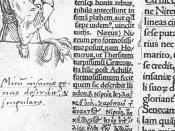On the Presentation of Folly
"This world we live in now has become a complete absurdity," in which only fools may live happily. Thus it follows that the goddess Folly is the source of all happiness in the world; and as the nature of happiness is such, it is only natural that Folly should, like Morality, Wit, and Valor, have praises written in her name. At least, this is the sentiment with which Folly honors her name. The Praise of Folly is an exaltation of the contributions Folly made to the state of society as Erasmus saw it. Also a biting work which exposes the many habitual faults of mankind, the book does not fall short where others of it's kind fail; i.e.- it is universal in subject matter and in theme, allowing it to stand the test of time and of the common man.
Styled as an Oratorical speech made by the great and revered goddess herself, The Praise of Folly makes extensive use of Erasmus' immense wit and observational skills.
Folly systematically describes her heavy influence on society in a series of flowing yet distinctly different contentions which demonstrate her involvement in the many aspects of human life such as marriage, superstition, and science. Strictly following the path of a valid but untrue pattern of inductive reasoning, Folly repeatedly uses the same syllogism to prove her point: fools are happy; wise men are unhappy; folly must be the source of all happiness. The unhappiness of wise men is based on the ability of scrutiny to expose the deficiencies of human beings without a means of correcting those deficiencies. The syllogism is a correctly formed one, but it's argument is not concrete. Erasmus fails to allow Folly to note (because it would undoubtedly cripple his largely persuasive argument)...


